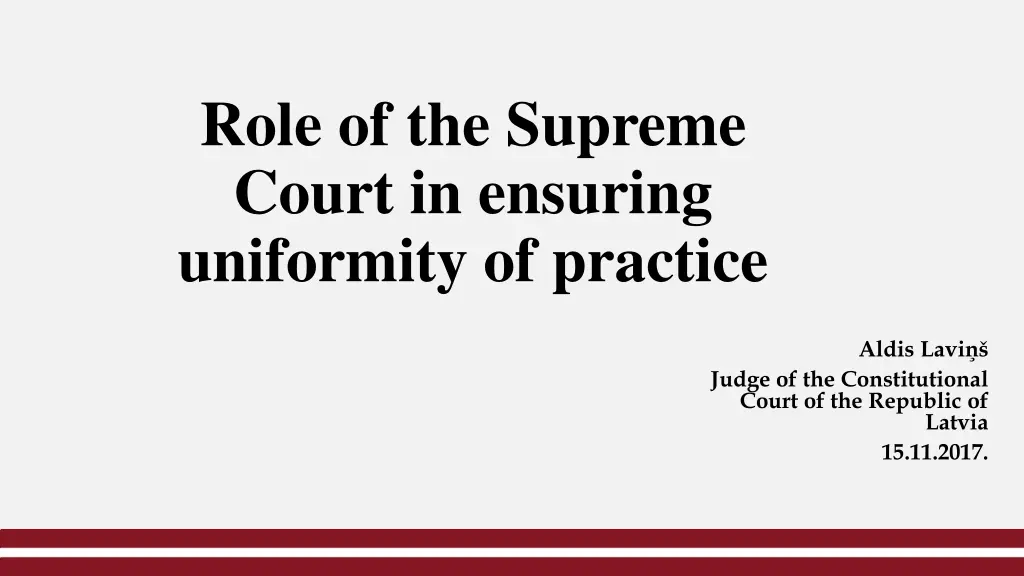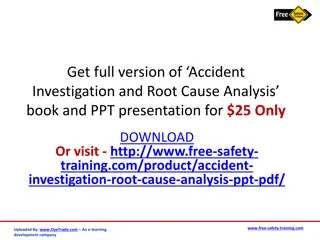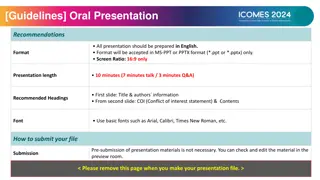
Role of Supreme Court in Ensuring Uniformity of Practice
Understanding the role of the Supreme Court in ensuring uniformity of practice within the legal system. Explore mechanisms, instruments, and ideas used to achieve this goal, along with the challenges faced in maintaining consistency in legal interpretation and application.
Download Presentation

Please find below an Image/Link to download the presentation.
The content on the website is provided AS IS for your information and personal use only. It may not be sold, licensed, or shared on other websites without obtaining consent from the author. If you encounter any issues during the download, it is possible that the publisher has removed the file from their server.
You are allowed to download the files provided on this website for personal or commercial use, subject to the condition that they are used lawfully. All files are the property of their respective owners.
The content on the website is provided AS IS for your information and personal use only. It may not be sold, licensed, or shared on other websites without obtaining consent from the author.
E N D
Presentation Transcript
Role of the Supreme Court in ensuring uniformity of practice Aldis Lavi Judge of the Constitutional Court of the Republic of Latvia 15.11.2017.
Constitutional framework Principle of equality states courts have to adjudicate similar cases in a similar manner, whilst different cases differently. ECtHR has ruled-State infringes the right to a fair court if: 1.national courts have failed to ensure uniformity of case- law; 2.there are no mechanisms that would ensure uniformity of case-law, or if no such mechanisms have been applied.
Mechanism to ensure uniformity of case-law 1) cassation instance predominantly protect public legal interests rather than private interests; 2) it reviews only quaestiones iuris, namely, issues regarding correct application of material or procedural norms. That s why the SC as a cassation court is the most suitable instance for achieving the aim - to ensure uniform interpretation and application of legal norms in the entire State.
Instruments for the SC In order to acieve uniform application of law it is important that the SC s resources are devoted to deal with legal issues, not with issues concerning questions of the facts. There is introduced so called system of filtering (around 70% cassation claims are declared as inadmissible).
Idea of filtering system Deal with legal issues (application of material or procedural norms) (what to do if conclusion of the appellate court does not comply in full extent with the content of the submitted evidences - is this legal issue?). Two aspects: 1) An oath of judges; 2) What is the competence of the Constitutional Court. It explains current legal position predominantly public interests.
Filtering system II Debate on so called appeal leaves system. -) The role of the SC is limited (1) it deals with small number of issues and (2) in many areas the SC rarely make decisions; -) SC should see all submitted cassation claims. Up to the SC to decide whether the legal issues have an importance concerning uniform application of law or the development of case law; -) it could jeopardise to achieve the goal to ensure greater uniformity of application of law.
Character of the ruling of the SC Principle of the independence of judges v. principle of equality (develop legal system and ensure uniformity); Gaps in law judges shoul find legal rule for resolution a case; Debate on the question whether the SC ruling belongs to so called obligatory source of law.
The manner to use the court practice The CJEU consistently refers to previous decisions, whereby the practice of the Court evolved into a primary means of argumentation before the Court (similar situation with the Strasbourg Court). If national SC consistently will refer to its previous rulings it would encourage the lower courts in wider extent use this method how to strengthen its argumentation with the referance to the Supreme Court position.
Instruments for the SC Law on Judicial Power: 1) Article 49.provides - SC Plenary Session has a competence to discuss topical questions of the interpretation of law; 2) Article 49.1.provides - that in order to ensure uniform application of law the Department of the SC (for instance, Department for Civil Cases all judges of this unit) has a competence to discuss topical questions of the interpretation of law and to render decision. This decision shall be published at the web page of the SC.It does not have a binding effect.
Collection of SCs rulings SC prepares a collection of court rulings with sentences and concise explanations. This is responsibility of the Department of Court Practice, but this unit works in very close cooperation with judges.
Dialogue enhance uniformity It is useful to establishe dialogue with: -) Court of Justice of the European Union in Luxemburg; -) European Court of Human Rights in Strasbourg. And -) with national Constitutional Court
Ideas for the future Build up the new type of dialogue between the SC and the lower courts: 1) so called pilot judgments ; 2) national Netherlands, Poland). prelimanary ruling system (France,
Thank you! I wish all the best in stengthening and developing Ukraine s legal system!






















